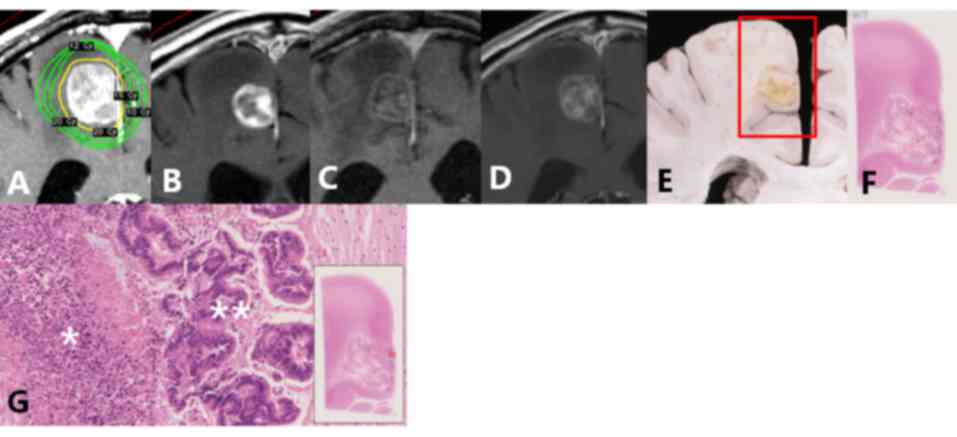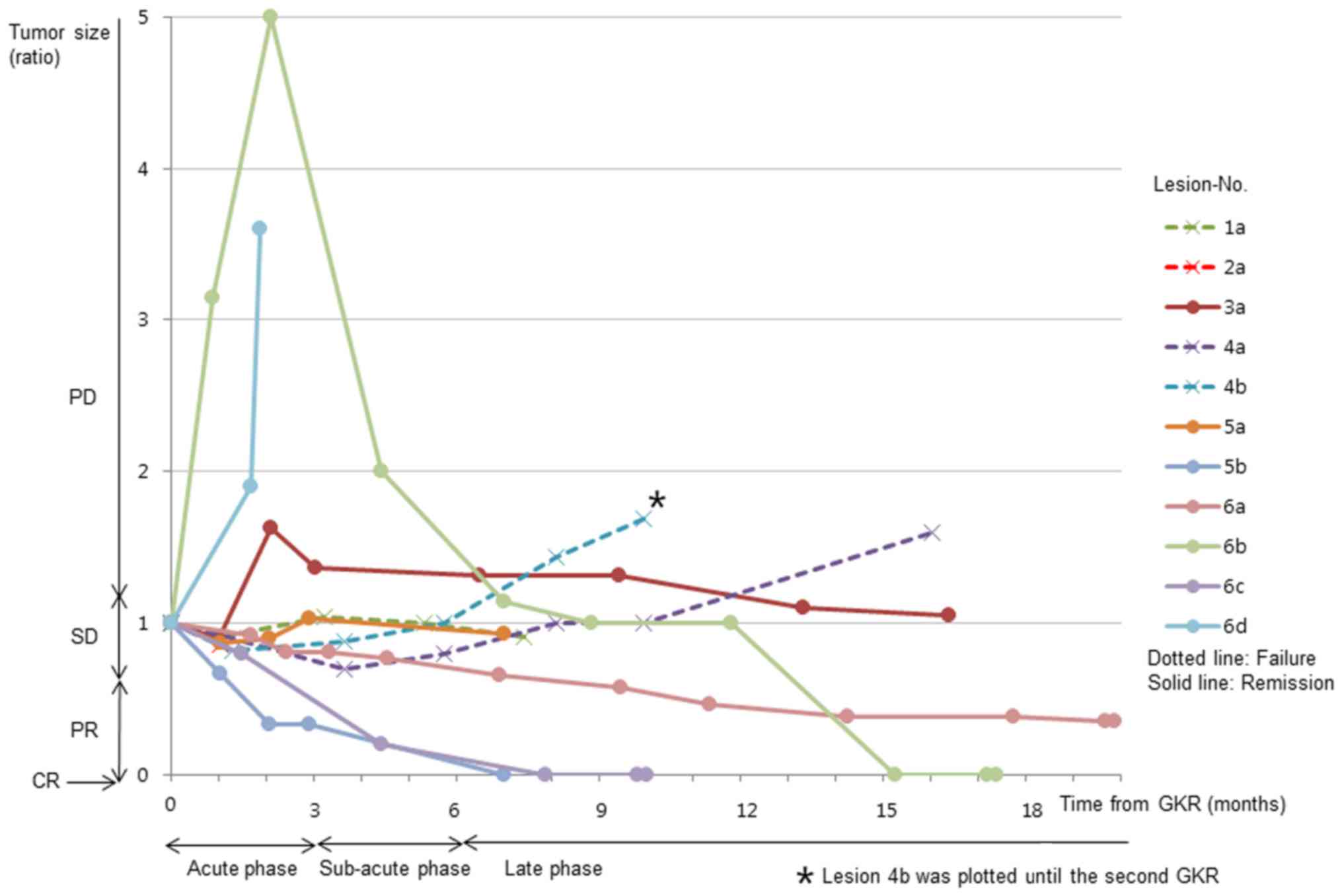|
1
|
Wen PY and Loeffler JS: Management of
brain metastases. Oncology (Williston Park). 13:941–954, 957-962,
969. 1999.PubMed/NCBI
|
|
2
|
Bouffet E, Doumi N, Thiesse P, Mottolese
C, Jouvet A, Lacroze M, Carrie C, Frappaz D and Brunat-Mentigny M:
Brain metastases in children with solid tumors. Cancer. 79:403–410.
1997. View Article : Google Scholar : PubMed/NCBI
|
|
3
|
Andrews DW, Scott CB, Sperduto PW,
Flanders AE, Gaspar LE, Schell MC, Werner-Wasik M, Demas W, Ryu J,
Bahary JP, et al: Whole brain radiation therapy with or without
stereotactic radiosurgery boost for patients with one to three
brain metastases: Phase III results of the RTOG 9508 randomised
trial. Lancet. 363:1665–1672. 2004. View Article : Google Scholar : PubMed/NCBI
|
|
4
|
Kocher M, Soffietti R, Abacioglu U, Villà
S, Fauchon F, Baumert BG, Fariselli L, Tzuk-Shina T, Kortmann RD,
Carrie C, et al: Adjuvant whole-brain radiotherapy versus
observation after radiosurgery or surgical resection of one to
three cerebral metastases: Results of the EORTC 22952-26001 study.
J Clin Oncol. 29:134–141. 2011. View Article : Google Scholar : PubMed/NCBI
|
|
5
|
Yamamoto M, Serizawa T, Shuto T, Akabane
A, Higuchi Y, Kawagishi J, Yamanaka K, Sato Y, Jokura H, Yomo S, et
al: Stereotactic radiosurgery for patients with multiple brain
metastases (JLGK0901): A multi-institutional prospective
observational study. Lancet Oncol. 15:387–395. 2014. View Article : Google Scholar : PubMed/NCBI
|
|
6
|
Young RF: Radiosurgery for the treatment
of brain metastases. Semin Surg Oncol. 14:70–78. 1998. View Article : Google Scholar : PubMed/NCBI
|
|
7
|
Mori Y, Kondziolka D, Flickinger JC, Logan
T and Lunsford LD: Stereotactic radiosurgery for brain metastasis
from renal cell carcinoma. Cancer. 83:344–353. 1998. View Article : Google Scholar : PubMed/NCBI
|
|
8
|
Mori Y, Kondziolka D, Flickinger JC,
Kirkwood JM, Agarwala S and Lunsford LD: Stereotactic radiosurgery
for cerebral metastatic melanoma: Factors affecting local disease
control and survival. Int J Radiat Oncol Biol Phys. 42:581–589.
1998. View Article : Google Scholar : PubMed/NCBI
|
|
9
|
Pirzkall A, Debus J, Lohr F, Fuss M, Rhein
B, Engenhart-Cabillic R and Wannenmacher M: Radiosurgery alone or
in combination with whole-brain radiotherapy for brain metastases.
J Clin Oncol. 16:3563–3569. 1998. View Article : Google Scholar : PubMed/NCBI
|
|
10
|
Tsuruda JS, Kortman KE, Bradley WG,
Wheeler DC, Van Dalsem W and Bradley TP: Radiation effects on
cerebral white matter: MR evaluation. AJR Am J Roentgenol.
149:165–171. 1987. View Article : Google Scholar : PubMed/NCBI
|
|
11
|
Dooms GC, Hecht S, Brant-Zawadzki M,
Berthiaume Y, Norman D and Newton TH: Brain radiation lesions: MR
imaging. Radiology. 158:149–155. 1986. View Article : Google Scholar : PubMed/NCBI
|
|
12
|
Jain R, Narang J, Sundgren PM, Hearshen D,
Saksena S, Rock JP, Gutierrez J and Mikkelsen T: Treatment induced
necrosis versus recurrent/progressing brain tumor: Going beyond the
boundaries of conventional morphologic imaging. J Neurooncol.
100:17–29. 2010. View Article : Google Scholar : PubMed/NCBI
|
|
13
|
Kumar AJ, Leeds NE, Fuller GN, Van Tassel
P, Maor MH, Sawaya RE and Levin VA: Malignant gliomas: MR imaging
spectrum of radiation therapy- and chemotherapy-induced necrosis of
the brain after treatment. Radiology. 217:377–384. 2000. View Article : Google Scholar : PubMed/NCBI
|
|
14
|
Smirniotopoulos JG, Murphy FM, Rushing EJ,
Rees JH and Schroeder JW: Patterns of contrast enhancement in the
brain and meninges. Radiographics. 27:525–551. 2007. View Article : Google Scholar : PubMed/NCBI
|
|
15
|
Alomari A, Rauch PJ, Orsaria M, Minja FJ,
Chiang VL and Vortmeyer AO: Radiologic and histologic consequences
of radiosurgery for brain tumors. J Neurooncol. 117:33–42. 2014.
View Article : Google Scholar : PubMed/NCBI
|
|
16
|
Kamada K, Mastuo T, Tani M, Izumo T,
Suzuki Y, Okimoto T, Hayashi N, Hyashi K and Shibata S: Effects of
stereotactic radiosurgery on metastatic brain tumors of various
histopathologies. Neuropathology. 21:307–314. 2001. View Article : Google Scholar : PubMed/NCBI
|
|
17
|
Hirato M, Hirato J, Zama A, Inoue H, Ohye
C, Shibazaki T and Andou Y: Radiobiological effects of gamma knife
radiosurgery on brain tumors studied in autopsy and surgical
specimens. Stereotact Funct Neurosurg. 66 Suppl 1:S4–S16. 1996.
View Article : Google Scholar
|
|
18
|
Truong MT, St Clair EG, Donahue BR, Rush
SC, Miller DC, Formenti SC, Knopp EA, Han K and Golfinos JG:
Results of surgical resection for progression of brain metastases
previously treated by gamma knife radiosurgery. Neurosurgery.
59:86–97. 2006. View Article : Google Scholar : PubMed/NCBI
|
|
19
|
Tsao MN, Rades D, Wirth A, Lo SS,
Danielson BL, Gaspar LE, Sperduto PW, Vogelbaum MA, Radawski JD,
Wang JZ, et al: Radiotherapeutic and surgical management for newly
diagnosed brain metastasis(es): An American Society for Radiation
Oncology evidence-based guideline. Pract Radiat Oncol. 2:210–225.
2012. View Article : Google Scholar : PubMed/NCBI
|
|
20
|
Sage MR, Wilson AJ and Scroop R: Contrast
media and the brain. The basis of CT and MR imaging enhancement.
Neuroimaging Clin N Am. 8:695–707. 1998.PubMed/NCBI
|
|
21
|
Provenzale JM, Mukundan S and Dewhirst M:
The role of blood-brain barrier permeability in brain tumor imaging
and therapeutics. AJR Am J Roentgenol. 185:763–767. 2005.
View Article : Google Scholar : PubMed/NCBI
|
|
22
|
Bucci L, Giannini A, Bellotti R,
Castellano AE and Carillo C: Role of hypernephroma in a case of
intracerebral hemorrhage as a 1st sign of metastasis. Case report.
Riv Neurol. 56:325–335. 1986.PubMed/NCBI
|
|
23
|
Bitoh S, Hasegawa H, Ohtsuki H, Obashi J,
Fujiwara M and Sakurai M: Cerebral neoplasms initially presenting
with massive intracerebral hemorrhage. Surg Neurol. 22:57–62. 1984.
View Article : Google Scholar : PubMed/NCBI
|
|
24
|
Hernandez L, Zamorano L, Sloan A,
Fontanesi J, Lo S, Levin K, Li Q and Diaz F: Gamma knife
radiosurgery for renal cell carcinoma brain metastases. J
Neurosurg. 97 5 Suppl:S489–S493. 2002.
|
|
25
|
Huber PE, Hawighorst H, Fuss M, van Kaick
G, Wannenmacher MF and Debus J: Transient enlargement of contrast
uptake on MRI after linear accelerator (linac) stereotactic
radiosurgery for brain metastases. Int J Radiat Oncol Biol Phys.
49:1339–1349. 2001. View Article : Google Scholar : PubMed/NCBI
|
|
26
|
Peterson AM, Meltzer CC, Evanson EJ,
Flickinger JC and Kondziolka D: MR imaging response of brain
metastases after gamma knife stereotactic radiosurgery. Radiology.
211:807–814. 1999. View Article : Google Scholar : PubMed/NCBI
|
|
27
|
Park KR, Monsky WL, Lee CG, Song CH, Kim
DH, Jain RK and Fukumura D: Mast cells contribute to
radiation-induced vascular hyperpermeability. Radiat Res.
185:182–189. 2016. View Article : Google Scholar : PubMed/NCBI
|
|
28
|
Da Silva AN, Nagayama K, Schlesinger D and
Sheehan JP: Early brain tumor metastasis reduction following Gamma
Knife surgery. J Neurosurg. 110:547–552. 2009. View Article : Google Scholar : PubMed/NCBI
|
















